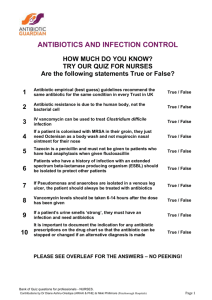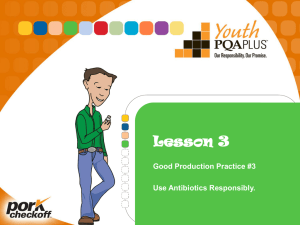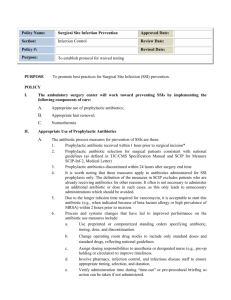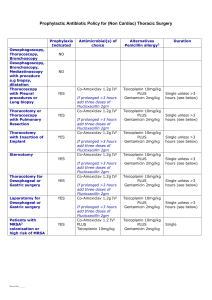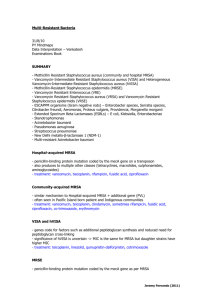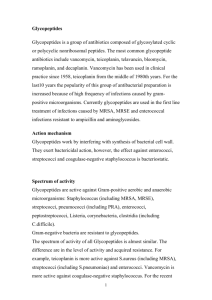Antibiotics & Infection Prevention Quiz for Pharmacy Staff
advertisement
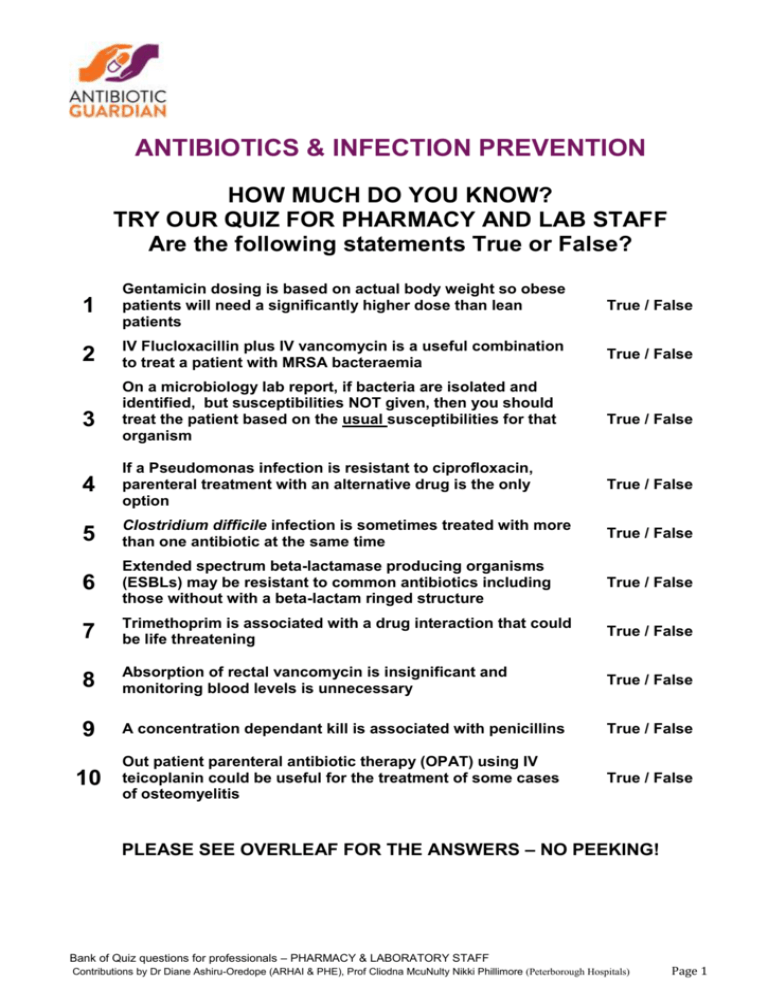
ANTIBIOTICS & INFECTION PREVENTION HOW MUCH DO YOU KNOW? TRY OUR QUIZ FOR PHARMACY AND LAB STAFF Are the following statements True or False? 1 Gentamicin dosing is based on actual body weight so obese patients will need a significantly higher dose than lean patients True / False 2 IV Flucloxacillin plus IV vancomycin is a useful combination to treat a patient with MRSA bacteraemia True / False 3 On a microbiology lab report, if bacteria are isolated and identified, but susceptibilities NOT given, then you should treat the patient based on the usual susceptibilities for that organism True / False 4 If a Pseudomonas infection is resistant to ciprofloxacin, parenteral treatment with an alternative drug is the only option True / False 5 Clostridium difficile infection is sometimes treated with more than one antibiotic at the same time True / False 6 Extended spectrum beta-lactamase producing organisms (ESBLs) may be resistant to common antibiotics including those without with a beta-lactam ringed structure True / False 7 Trimethoprim is associated with a drug interaction that could be life threatening True / False 8 Absorption of rectal vancomycin is insignificant and monitoring blood levels is unnecessary True / False 9 A concentration dependant kill is associated with penicillins True / False 10 Out patient parenteral antibiotic therapy (OPAT) using IV teicoplanin could be useful for the treatment of some cases of osteomyelitis True / False PLEASE SEE OVERLEAF FOR THE ANSWERS – NO PEEKING! Bank of Quiz questions for professionals – PHARMACY & LABORATORY STAFF Contributions by Dr Diane Ashiru-Oredope (ARHAI & PHE), Prof Cliodna McuNulty Nikki Phillimore (Peterborough Hospitals) Page 1 ANTIBIOTICS & INFECTION PREVENTION PHARMACY AND LAB STAFF QUIZ – ANSWERS Gentamicin dosing is based on actual body weight so obese patients will need a significantly higher dose than lean patients False – it is based on ideal body weight 1 IV Flucloxacillin plus IV vancomycin is a useful combination to treat a patient with MRSA bacteraemia False – the flucloxacillin would be serving no purpose as by definition MRSA is resistant to flucloxacillin 2 On a microbiology lab report, if bacteria are isolated and identified, but susceptibilities NOT given, then you should treat the patient based on the usual susceptibilities for that organism False – the lab should be contacted for susceptibilities. Not providing susceptibilities on the initial report is an indication that the bacteria is a coloniser and treatment may not be necessary. Individual cases should be discussed with a microbiologist 3 If a Pseudomonas infection is resistant to ciprofloxacin, parenteral treatment with an alternative drug is the only option True – All other groups of antibiotics with activity against Pseudomonas species are only available parenterally 4 Clostridium difficile infection is sometimes treated with more than one antibiotic at the same time True – Metronidazole plus vancomycin is a useful combination for serious cases 5 Extended spectrum beta-lactamase producing organisms (ESBLs) may be resistant to common antibiotics including those without with a beta-lactam ringed structure True – ESBLs are commonly resistant to non beta-lactam antibiotics 6 7 Trimethoprim is associated with a drug interaction that could be life threatening True – Trimethoprim used in combination with Methotrexate has caused fatalities. 8 Absorption of rectal vancomycin is insignificant and monitoring blood levels is unnecessary False – Significant amounts can be absorbed rectally and it is prudent to take levels 9 A concentration dependant kill is associated with penicillins False – Penicillin is a time-dependent antibiotic and exerts optimal bactericidal effect when drug concentrations are maintained above the minimum inhibitory concentration (MIC) of the organism. 10 Out patient parenteral antibiotic therapy (OPAT) using IV teicoplanin could be useful for the treatment of some cases of osteomyelitis True – Where the organism is susceptible to teicoplanin, it is useful for OPAT as it can be given once daily (or even three times a week) Bank of Quiz questions for professionals – PHARMACY & LABORATORY STAFF Contributions by Dr Diane Ashiru-Oredope (ARHAI & PHE), Prof Cliodna McuNulty Nikki Phillimore (Peterborough Hospitals) Page 2

